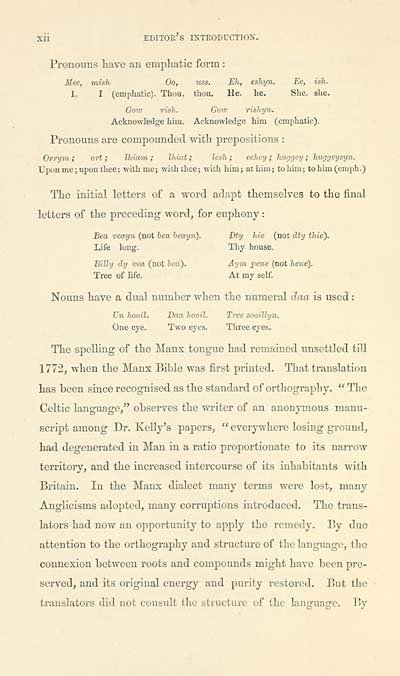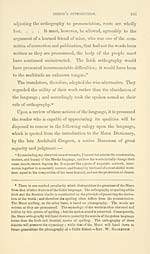Blair Collection > Practical grammar of the antient Gaelic, or, Language of the Isle of Man, usually called Manks
(16)
Download files
Complete book:
Individual page:
Thumbnail gallery: Grid view | List view

Xll: EDITOR S INTRODUCTION.
Prouoiins liavc au empliatic form :
Mee, mish Oo, uss. Eh, esliyn. Ee, ish.
I, I (emphatic). Thou, thou. He. he. She. she.
Golu risk. Goiv rishyn.
Acknowledge him. Acknowledge him (emphatic).
Pronouns are compounded with prepositions :
Orrym ; ort ; IMam ; Ihiat ; lesh ; ediey ; Imggey ; hv^geysyn.
Upon me ; upon thee ; withmc; with thee; with him; at him; to him; tohim(cmph.)
The initial letters of a word adapt themselves to the final
letters of the preceding word, for euphony :
Bea veayn (not bea heayn). Dty hie (not dty thie).
Life long. Thy house.
BiUy dy vea (not bea). Aym pene (not hene).
Tree of life. At my self
Nouns have a dual number when the numeral daa is used :
Un hooil. Daa hooil. Tree sooillyn.
One eye. Two eyes. Three eyes.
The spelling of the Manx tongue had remained unsettled till
1772, when the Manx Bible was first printed. That translation
has been since recognised as the standard of orthography. " The
Celtic language/' observes the writer of an anonymous manu-
script among Dr. Kelly's papers, " everywhere losing ground,
had degenerated in Man in a ratio proportionate to its narrow
territory, and the increased intercourse of its inhabitants with
Britain. In the Manx dialect many terms were lost, many
Anglicisms adopted, many corruptions introduced. The trans-
lators had now an opportunity to apply the remedy. By duo
attention to the orthography and structure of the language, the
connexion between roots and compounds might have been pre-
served, and its original energy and purity restored. But the
translators did not consult the structure of the language. By
Prouoiins liavc au empliatic form :
Mee, mish Oo, uss. Eh, esliyn. Ee, ish.
I, I (emphatic). Thou, thou. He. he. She. she.
Golu risk. Goiv rishyn.
Acknowledge him. Acknowledge him (emphatic).
Pronouns are compounded with prepositions :
Orrym ; ort ; IMam ; Ihiat ; lesh ; ediey ; Imggey ; hv^geysyn.
Upon me ; upon thee ; withmc; with thee; with him; at him; to him; tohim(cmph.)
The initial letters of a word adapt themselves to the final
letters of the preceding word, for euphony :
Bea veayn (not bea heayn). Dty hie (not dty thie).
Life long. Thy house.
BiUy dy vea (not bea). Aym pene (not hene).
Tree of life. At my self
Nouns have a dual number when the numeral daa is used :
Un hooil. Daa hooil. Tree sooillyn.
One eye. Two eyes. Three eyes.
The spelling of the Manx tongue had remained unsettled till
1772, when the Manx Bible was first printed. That translation
has been since recognised as the standard of orthography. " The
Celtic language/' observes the writer of an anonymous manu-
script among Dr. Kelly's papers, " everywhere losing ground,
had degenerated in Man in a ratio proportionate to its narrow
territory, and the increased intercourse of its inhabitants with
Britain. In the Manx dialect many terms were lost, many
Anglicisms adopted, many corruptions introduced. The trans-
lators had now an opportunity to apply the remedy. By duo
attention to the orthography and structure of the language, the
connexion between roots and compounds might have been pre-
served, and its original energy and purity restored. But the
translators did not consult the structure of the language. By
Set display mode to: Large image | Transcription
Images and transcriptions on this page, including medium image downloads, may be used under the Creative Commons Attribution 4.0 International Licence unless otherwise stated. ![]()
| Early Gaelic Book Collections > Blair Collection > Practical grammar of the antient Gaelic, or, Language of the Isle of Man, usually called Manks > (16) |
|---|
| Permanent URL | https://digital.nls.uk/81513614 |
|---|
| Description | A selection of books from a collection of more than 500 titles, mostly on religious and literary topics. Also includes some material dealing with other Celtic languages and societies. Collection created towards the end of the 19th century by Lady Evelyn Stewart Murray. |
|---|
| Description | Selected items from five 'Special and Named Printed Collections'. Includes books in Gaelic and other Celtic languages, works about the Gaels, their languages, literature, culture and history. |
|---|

